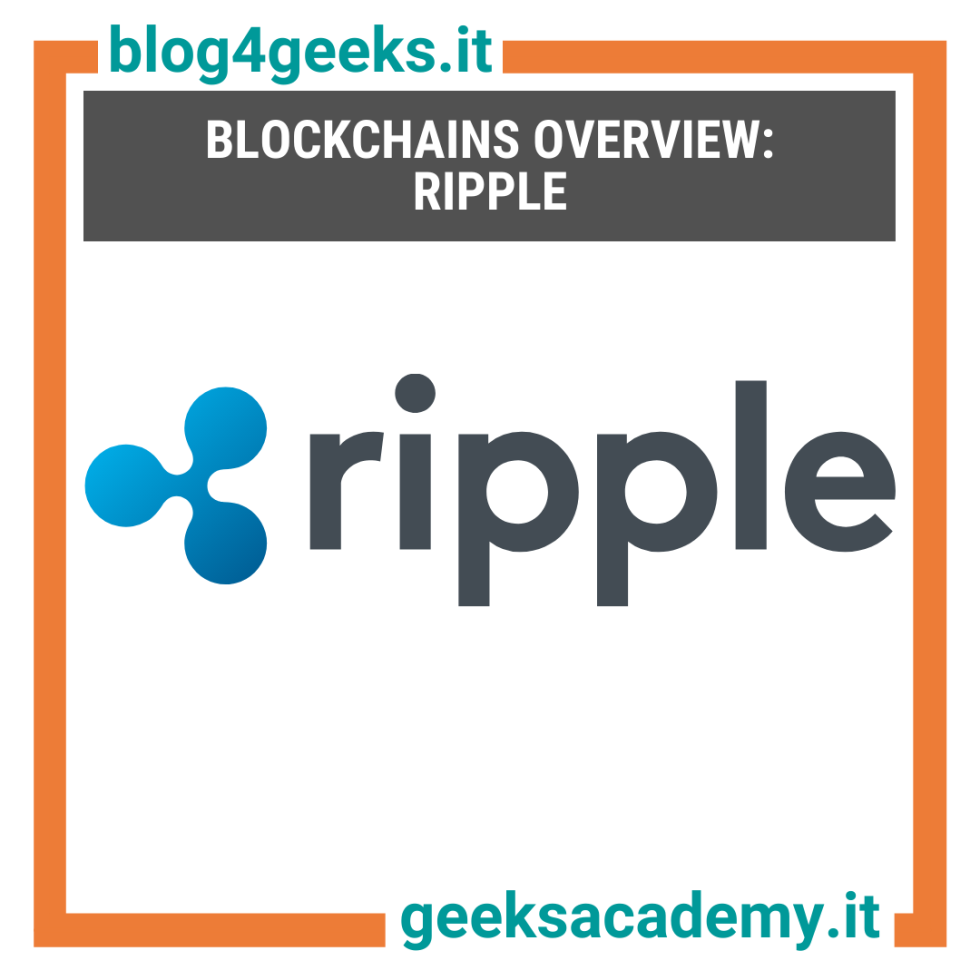
Discover Geeks Academy’s articles on: Blockchain, Coding, Cybersecurity, Cloud, Big Data, Artificial Intelligence, Gaming, Digital Innovation
XRP is the token running on the Ripple network: it is one of the earliest blockchains and its goal is to create a decentralized monetary system, ensuring transparency, speed and efficiency for the whole banking and institutional system.
Ripple’s history
It all began in 2012. Ripple was born as OpenCoin, founded by Chris Larsen and Jed McCaleb. One year later, OpenCoin changed its name to Ripple. The main idea is similar to many other projects’ which came up shortly after Bitcoin: to eliminate and overcome the issues and disadvantages of Bitcoin. The key point behind Ripple is the P2P monetary system (peer to peer technology), something that has been constantly part of Jed McCaleb's work. However Ripple’s primary purpose is to eliminate, or at least reduce, brokerage costs on financial transactions. Basically, we are talking about those commission costs we owe to a bank when we transfer or withdraw money through debit cards.
A difference with Bitcoin is the presence of transaction logs called Ledgers, which allow to keep track of exchanges and make transactions within seconds. One more key element of Ripple network is the ability to exchange and transfer money between different currencies. For instance, I can transfer Eur to a user even if my currency is Yen. Also think of those currencies which must necessarily go through the US dollar. Thanks to Ripple, not only will they not pay commissions but they will not even have to deal with USD fluctuations.
RippleNet
Ripple has three important elements: a payment network, an exchange and its own currency (XRP). Therefore Ripple stands as an upgraded version of the current financial brokerage system, given that most of its operation is based on trust. The Ripple network is based on the mechanism of trust represented by IOU credits (I Owe You) which represent real currencies. What is sent and received are specifically these credits which are converted into "real" money in the so-called Ripple gateways. All debts, i.e. transactions, occur only between subjects who have established a bond of trust, adhering to the Ripple network. Ripple transactions are instant, free and irreversible. XRP is the only currency circulating in the Ripple network and is also the unit of measurement for the exchange of IOU credits.
So, if I want to send Dollars but I only have Euros available, the recipient of the transaction will buy my IOU in Euros for n Ripple, and sell IOU in Yen for n Ripple.
SEC lawsuit
The consensus protocol is called RPCA, where specific validator nodes have the task of validating transactions; this makes the system less decentralized than Bitcoin and other currencies, because the goal is to remain an internal system. This has also been one of the main reasons causing the SEC (U.S. Securities and Exchange Commission) lawsuit that has been taking place for years, due to the dispute regarding the token type. Being one of the first coins, Ripple itself has defined XRP as a utility token, like many other fully decentralized protocols, also in order to not run into bureaucratic limitations. However, either the token distribution practice and the ineffective decentralization of the protocol have allowed the SEC to argue about the nature of XRP as a security token, a fungible and taxable asset as an investment, entered into the market without a license (as happened for Bitcoin and Ethereum).
Why you should learn blockchain?
DeFi, Agrifood, IoT, Sharing Economy, Insurance, Art, Gaming, Law. Blockchain’s use cases are endless, and understanding the way to make this technology even more efficient is just the beginning. One of the most relevant field of application is the industrial sector, where countless jobs of the future could theoretically be replaced by smart contracts, oracles and AI.
Blockchain’s skills are increasingly in demand. It is not too late to start your career now: blockchain is just becoming everyday life. However, the learning curve is still steep: many companies still cannot fully understand the difference between an usual database and a blockchain, so when they turn to business advisors, their use cases are often not suitable for the technology they want to use.
Here’s what it takes:
By checking different job vacancies, this is a list of the most relevant skills and requirements:
- Understanding of algorithms, data security, decentralized technologies and data structures.
- A solid background in coding skills, with at least one of the following programming languages: Python, JavaScript, JAVA, C, C++.
- General understanding of ledgers, blockchains and cryptocurrencies.
- Expertise in performance management and anomaly detection.
- At least basic experience in building blockchain frameworks and business applications.
Don't live the future as a sidekick... be a superhero! Discover Geeks Academy’s training offer in Blockchain & Coding:
Blockchains Overview is an in-depth series about the most popular blockchains. Below a comprehensive list of the ones we have been talking about: